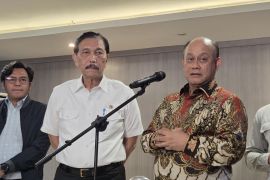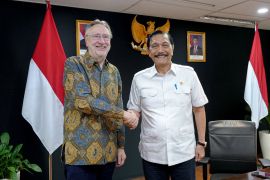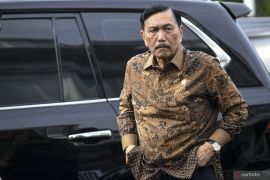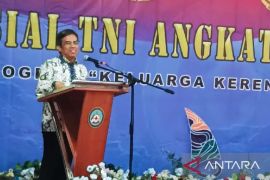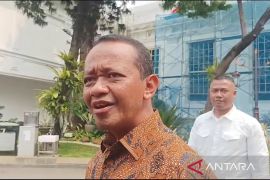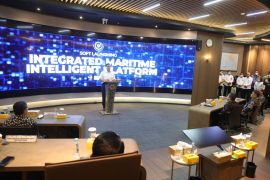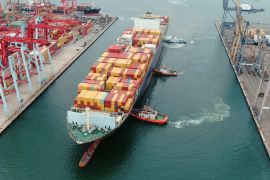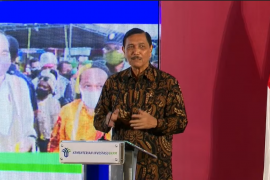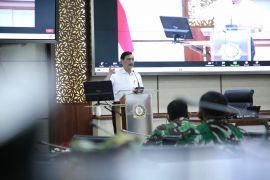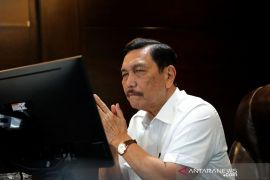Everyone has the right to derive benefits from the digital economy. To get more, to choose flexible jobs, and to learn new skillsJakarta (ANTARA) - Coordinating Minister for Maritime Affairs and Investment Luhut Binsar Pandjaitan gave weightage to the importance of the government’s cooperation with technology companies to usher in improvements in the country’s socioeconomic conditions.
The minister delivered the statement in his opening remarks at the GrabLuncheon with big tech companies -- Microsoft, VMWare, Global Uber, and Global Mastercard President Singapore ICT Minister -- held on the sidelines of the World Economic Forum (WEF) 2020 in Davos, Switzerland, on Tuesday, Jan 21.
"Specifically, today, I want to highlight the government's role in working along with tech companies to utilize technology to drive economic and social improvements for our citizens," he noted in a statement here on Wednesday.
Pandjaitan pointed to the current trend of technology becoming an intrinsic part of the lives of people. Digitalization and technology almost always accompany all activities conducted by humans.
"Everyone has the right to derive benefits from the digital economy. To get more, to choose flexible jobs, and to learn new skills. In developing regions, such as Southeast Asia, giving people access to digital platforms can significantly improve the quality of life for the subsequent generations," he explained.
The minister also expounded that to bring about technological improvements, Indonesian President Joko Widodo had prioritized the development of quality human resources.
"This is where I believe technology companies will have an important role to play in it. As with Indonesia, I believe many governments around the world look at leaders in the industrial sector like you to work together in developing people, with talent, to help build the nation," he noted.
Pandjaitan is upbeat about technology companies being able to help the government also build the right ecosystem for a Research and Development center for proffering long-term benefits to all nations.
"It is also important that technology companies remain committed to being here for the long term, building for future generations, not only making money, but also helping governments find solutions to our problems," he noted.
Pandjaitan also stressed that the Indonesian government was open to working with the private sector while pointing out that several other countries had emulated the Indonesian government’s approach.
"For leaders of the private sector and technology industry like you, it is important to demonstrate the same commitment to developing society and the nation. That is the best way for the government and private sector to work together, utilizing technology forever," he concluded.
Indonesia had earlier registered the highest growth in digital economy among ASEAN member countries, at 90 percent, during the 2015-2017 period, Deputy of Infrastructure of the Creative Economy Agency (Bekraf) Hari Santosa Sungkari stated.
Related news: Indonesia can become model of digital economic development for AIS
"During the 2015-2017 period, Indonesia's digital economy has recorded a growth of almost 90 percent," Sungkari noted.
Sungkari pointed to transactions through e-commerce platforms mostly being conducted by creative industry players and small- and medium-scale entrepreneurs.
In 2017, the value of e-commerce transactions in Indonesia has reached US$8 million, of which $5 million were made through online stores, including Bukalapak and Tokopedia.
"The interesting fact is that of the US$5 million (transactions), the sellers are small firms led by women," he revealed.
He disclosed that during the visit to several regions, including Magelang, Salatiga, and Bengkulu, he has met with housewives, who sold their handicrafts and snack products online.
"It is important for us that digital transactions will benefit Indonesia," Sungkari emphasized.
Related news: Government launching two special economic zones in Batam in 2020
Related news: Indonesia poised to become Southeast Asian giant in digital economy
EDITED BY INE
Translator: Ade Irma, Azis Kurmala
Editor: Fardah Assegaf
Copyright © ANTARA 2020



